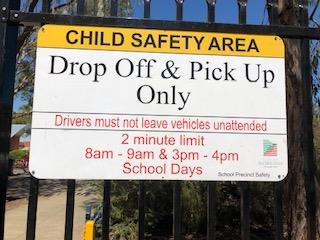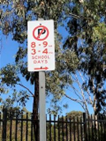Student Wellbeing
At Modbury West School we offer many programs and activities which enhance student learning and wellbeing.

A major emphasis is placed on providing a safe, supportive learning environment free of harassment, racism and discrimination for all who are involved in the school.
Students are taught skills to help them feel safe, including telling an adult if they are harassed or bullied. We provide individual, small group and whole class learning focussing on student wellbeing.
We ask parents/guardians to talk to us if they feel their child is concerned about something happening at school.
Student behaviour
Modbury West has three values that are displayed in all areas of the school – We teach our students to be RESILIENT, RESPECTFUL and display RIGOUR. Parents and Guardians are notified when serious classroom or yard behaviour breaches occur. Suspension is used in line with DfE policy. The school uses the Berry Street framework to support students to be safe, thrive and be hopeful throughout their lives.
Emergency Lunches
Student who for any reason do not have lunch will be provided with either a cheese or vegemite sandwich.
Crunch and Sip
Crunch & Sip® is a set break for students to eat fruit or vegetables and drink water in the classroom. Modbury West has introduced Crunch & Sip® to support students to establish healthy eating habits whilst at school. All classes enjoy a Crunch & Sip® break and eat fruit or vegetables and drink water in the classroom every day.
Breakfast Club
Open to everyone everyday 8.20 – 8.40am
Toast and fruit available from the STEM kitchen.
Health and Security of Children
We ask that parents/guardians/carers:
- Always send a note to explain your child’s absence or lateness.
- Send a note if an afternoon’s absence is foreseen, using the child’s diary/communication book, and sign your child out at the Front Office before picking up your child. NO CHILD WILL BE PERMITTED TO LEAVE SCHOOL (BEFORE DISMISSAL) WITHOUT AN EARLY COLLECTION SLIP COMPLETED AT THE FRONT OFFICE BY AN ADULT APPROVED BY PARENT/GUARDIAN AND GIVEN TO THE TEACHER.
- Complete a Health Care Plan if your child has health issues (see office staff for more information)
- Not send your child to school if he/she is ill. We do not have the facilities for adequate care of sick children for any length of time
- Provide an up to date copy of any parenting orders or inform us in writing of any custody, access or safety issues regarding your child
Parking and Road Safety
Our school is located in a dangerous position being on a hill and bounded by two very busy roads. We urge all parents and guardians at all times to drive with the utmost care and observe all signs, particularly the “No Standing” notices. These signs mean that you cannot stop at all, even to drop a child off.
A drop off zone is operational in the morning on Wright Road and Onslow Road. This means you can only pull up and allow your child to quickly get out of the car. You must not park your car when drop off zones are in place.
Trained monitors are on duty every morning and afternoon on the Wright Road crossing.
Please ensure that your child does not run onto the road when they see your car and please do not double park. FROM TIME TO TIME PARKING INSPECTORS MONITOR NEARBY ROADS and PARKING.
Wet days in particular are extremely hazardous. Double parking creates a dangerous situation for other children as well as your own. Finding a place to park may take a few minutes longer but children’s safety is the priority.

FOR SAFETY REASONS PARENTS ARE NOT TO PARK IN THE STAFF CAR PARK.
 Please ask students to exit and enter the vehicle from the kerb side rather than the road side. It is much safer for all.
Please ask students to exit and enter the vehicle from the kerb side rather than the road side. It is much safer for all.
- Please encourage your child to use the Kelly Road, Wright Road and Onslow Road crossings and support us in our attempts to educate children in all aspects of road safety, including bicycle safety.
- Parents are strongly advised to provide a padlock for their child if he/she rides a bicycle to school.
- Bicycles/Skateboards and Scooters are not to be ridden in the school grounds.
- While the school takes every precaution to ensure the safety of your child’s bike, school does not take responsibility for loss or damaged bikes.
We expect parents and guardians to be excellent role models for their own children and others by using the crossings and observing safe practices.
Emergency Contact Information
At the beginning of each year a form will be sent home to enable parents to update emergency contacts and medical details. This updated information is absolutely essential to us so that we can contact a parent or nominee in case of an emergency involving their child.
Please inform us immediately if there are any changes to contact details, particularly mobile numbers.
Accidents and Illness
Our staff are not trained health professionals. Staff will provide an initial assessment and simple treatment to students who are injured or feel ill. The school will contact parents and guardians to make a final decision about seeking further medical advice or treatment.
In the event of an accident or illness, you or your nominee will be contacted as soon as possible by a Staff member. Our School Service Officers have undergone First Aid training and are responsible for assisting children when injured or ill. If a child sustains a knock to the head, parents are contacted by phone in case of a delayed reaction. If a child requires emergency treatment, an ambulance will be called.
Ambulance Subscription
On occasions ambulances are called and we strongly recommend Parents/ Guardians have ambulance cover for their child(ren) through medical/hospital funds, through subscriptions directly to St. John Ambulance or through School Accident Insurance schemes.
Modbury West School Health Support Policy
Modbury West School is committed to supporting the health and wellbeing of all students. Parents/Guardians retain primary responsibility for their child’s health care. This includes responsibility for providing accurate, up-to-date relevant information to staff regarding their child’s routine and emergency health care needs. Students will be supported to develop safe, self-management of their health care needs. This will occur with respect to the student’s age and stage of development.
The school does not have the facilities or skills to care for sick students other than to provide first aid. Students who are ill should rest and recover at home until they are well enough to return to school.
Routine Health and Personal Care Support
Some students may require assistance with their routine or emergency health and personal care needs. Before staff can assist with this, parents/guardians must provide written information from their doctor which outlines specific care needs. Forms are available from the front office for a range of health conditions and needs, including:
- Asthma
- Diabetes
- Anaphylaxis (severe allergy)
- Medical information (for General health care or those without specific forms)
- General health information (to be completed by a general practitioner, psychiatrist or psychologist)
The purpose of these health care plans is to ensure that the school has information from the treating health professional relevant to the student’s health, well-being, attendance, learning and care at school.
Asthma
Students with asthma (even if only ‘mild’ or ‘occasional’) need an asthma care plan completed and signed by the treating doctor and given to the front office staff. Staff can remind students to take their preventative asthma medication prior to physical activity if this is part of the asthma care plan. Staff are also trained to administer reliever medication in the event of asthma attack. The school has reliever medication for use in emergency situations only. All students who require asthma medication must have puffers in the front office. All asthma puffers must have the pharmacist label, including the student’s name, stuck on the puffer.
Children with asthma carry their medication themselves only where specified by a doctor on their Health Care plan and on excursions.
Head Lice
In line with DfE’s current policy on head lice management, children are not excluded from class if we suspect they have head lice, but it is advised that these children are not involved in activities that include hair to hair/head to head contact. Parents are not required to collect their children before the end of the school day, but we will contact parents (class teacher or office) and ask for them to check and treat if necessary. Letters will be sent home with children in the class notifying them there is a suspected case of head lice.
The South Australian Health Commission recommends that everyone checks their child’s hair every week for head lice.
Checking and treating children’s hair is PARENTAL RESPONSIBILITY.
Medication Management
As much as possible, we encourage students to take medication outside of school hours, e.g. three times per day can be taken in the morning before school, afternoon straight after school and bedtime. If medication is necessary at school, students will be supervised in managing this process themselves or will be given the medication by front office staff.
- Medication must be provided in the original pharmacist container with directions on the label
- The child’s name must be on the original label
- Medication must be stored safely and so needs to be taken to the front office and given to a front office staff member for storage in a secure cupboard. This should be handed from adult to adult.
- Students must have a medication plan filled out by a doctor and the parent/carer
- A maximum of a week’s supply is to be provided at any time (except asthma medication)
- It is the parents/guardians responsibility to provide the medication.
- A medication log will be filled out by the front office staff member supervising and the staff member giving the medication.
- All medication must be replaced once out of date.
Our Address
450-474 Wright Road
Modbury SA 5092
Education Office
Felixstow
Respect - Resilience - Rigour


 Please ask students to exit and enter the vehicle from the kerb side rather than the road side. It is much safer for all.
Please ask students to exit and enter the vehicle from the kerb side rather than the road side. It is much safer for all.




